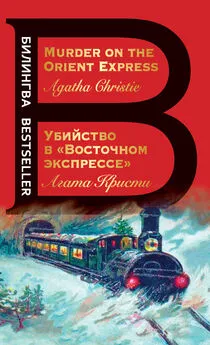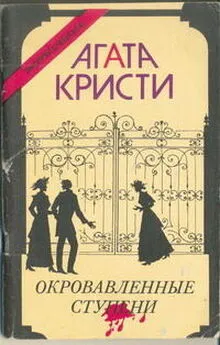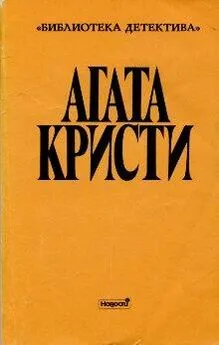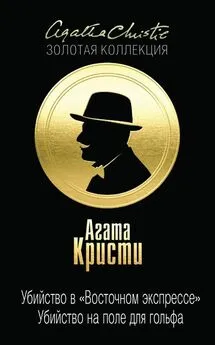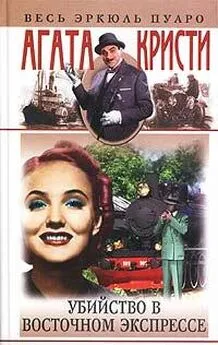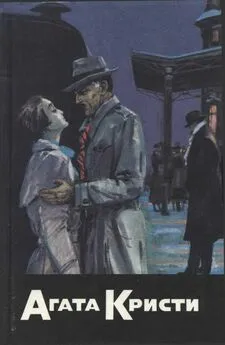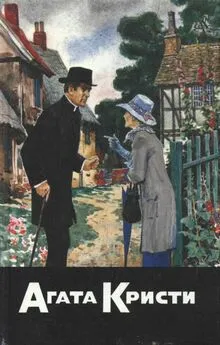Агата Кристи - Убийство в «Восточном экспрессе» / Murder on the Orient Express
- Название:Убийство в «Восточном экспрессе» / Murder on the Orient Express
- Автор:
- Жанр:
- Издательство:Литагент 1 редакция (7)
- Год:1934
- ISBN:978-5-04-114084-7
- Рейтинг:
- Избранное:Добавить в избранное
-
Отзывы:
-
Ваша оценка:
Агата Кристи - Убийство в «Восточном экспрессе» / Murder on the Orient Express краткое содержание
Убийство в «Восточном экспрессе» / Murder on the Orient Express - читать онлайн бесплатно ознакомительный отрывок
Интервал:
Закладка:
He gave M. Bouc an affectionate smile.
“It has been a little joke between us, has it not – this business of sitting back and thinking out the truth? Well, I am about to put my theory into practice – here before your eyes. You two must do the same. Let us all three close our eyes and think…“One or more of those passengers killed Ratchett. Which of them?”
Chapter 3
Certain Suggestive Points
It was quite a quarter of an hour before anyone spoke.
M. Bouc and Dr. Constantine had started by trying to obey Poirot’s instructions.
M. Bouc’s thoughts had run something as follows:
“Assuredly I must think. But as far as that goes I have already thought… Poirot obviously thinks that this English girl is mixed up in the matter. I cannot help feeling that that is most unlikely… The English are extremely cold. Probably it is because they have no figures… But that is not the point. It seems that the Italian could not have done it – a pity. I suppose the English valet is not lying when he said the other never left the compartment? But why should he! It is not easy to bribe the English; they are so unapproachable. The whole thing is most unfortunate. I wonder when we shall get out of this. There must be some rescue work in progress. They are so slow in these countries… it is hours before anyone thinks of doing anything. And the police of these countries, they will be most trying to deal with – puffed up with importance, touchy, on their dignity. They will make a grand affair of all this. It is not often that such a chance comes their way. It will be in all the newspapers…”
And from there on, M. Bouc’s thoughts went along a well-worn course which they had already traversed some hundred times.
Dr. Constantine’s thoughts ran thus:
“He is queer, this little man. A genius? Or a crank? Will he solve this mystery? Impossible – I can see no way out of it. It is all too confusing… Everyone is lying, perhaps… But even then, that does not help one. If they are all lying, it is just as confusing as if they were speaking the truth. Odd about those wounds. I cannot understand it… It would be easier to understand if he had been shot – after all, the term ‘gunman’ must mean that they shoot with a gun. A curious country, America. I should like to go there. It is so progressive. When I get home I must get hold of Demetrius Zagone – he has been to America, he has all the modern ideas… I wonder what Zia is doing at this moment. If my wife ever finds out—”
His thoughts went on to entirely private matters…
Hercule Poirot sat very still. One might have thought he was asleep.
And then, suddenly, after a quarter of an hour’s complete immobility his eyebrows began to move slowly up his forehead. A little sigh escaped him. He murmured beneath his breath.
“But after all, why not? And if so – why, if so, that would explain everything.”
His eyes opened. They were green like a cat’s. He said softly:
“Eh bien. I have thought. And you?”
Lost in their reflections, both men started violently.
“I have thought also,” said M. Bouc, just a shade guiltily. “But I have arrived at no conclusion. The elucidation of crime is your métier, not mine, my friend.”
“I, too, have reflected with great earnestness,” said the doctor, unblushingly recalling his thoughts from certain pornographic details. “I have thought of many possible theories, but not one that really satisfies me.”
Poirot nodded amiably. His nod seemed to say: “Quite right. That is the proper thing to say. You have given me the cue I expected.”
He sat very upright, threw out his chest, caressed his moustache and spoke in the manner of a practised speaker addressing a public meeting.
“My friends, I have reviewed the facts in my mind, and have also gone over to myself the evidence of the passengers – with this result: I see, nebulously as yet, a certain explanation that would cover the facts as we know them. It is a very curious explanation, and I cannot be sure as yet that it is the true one. To find out definitely I shall have to make certain experiments.
“I would like first to mention certain points which appear to me suggestive. Let us start with a remark made to me by M. Bouc in this very place on the occasion of our first lunch together on the train. He commented on the fact that we were surrounded by people of all classes, of all ages, of all nationalities. That is a fact somewhat rare at this time of year. The Athens – Paris and the Bucharest – Paris coaches, for instance, are almost empty. Remember also, the passenger who failed to turn up. He is, I think, significant. Then there are some minor points that strike me as suggestive – for instance, the position of Mrs. Hubbard’s sponge-bag, the name of Mrs. Armstrong’s mother, the detective methods of M. Hardman, the suggestion of M. MacQueen that Ratchett himself destroyed the charred note we found, Princess Dragomiroff’s Christian name, and a grease spot on a Hungarian passport.”
The two men stared at him.
“Do they suggest anything to you, those points?” asked Poirot.
“Not a thing,” said M. Bouc frankly.
“And M. le docteur?”
“I do not understand in the least what you are talking of.”
M. Bouc, meanwhile, seizing upon the one tangible thing his friend had mentioned, was sorting through the passports. With a grunt he picked up that of Count and Countess Andrenyi and opened it.
“Is this what you mean? This dirty mark?”
“Yes. It is a fairly fresh grease spot. You notice where it occurs?”
“At the beginning of the description of the Count’s wife – her Christian name, to be exact. But I confess that I still do not see the point.”
“I am going to approach it from another angle. Let us go back to the handkerchief found at the scene of the crime. As we stated not long ago, three people are associated with the letter H: Mrs. Hubbard, Miss Debenham and the maid, Hildegarde Schmidt. Now let us regard that handkerchief from another point of view. It is, my friends, an extremely expensive handkerchief – an objet de luxe, hand-made, embroidered in Paris. Which of the passengers, apart from the initial, was likely to own such a handkerchief? Not Mrs. Hubbard, a worthy woman with no pretensions to reckless extravagance in dress. Not Miss Debenham – that class of Englishwoman has a dainty linen handkerchief, not an expensive wisp of cambric costing perhaps two hundred francs. And certainly not the maid. But there are two women on the tram who would be likely to own such a handkerchief. Let us see if we can connect them in any way with the letter H. The two women I refer to are Princess Dragomiroff—”
“Whose Christian name is Natalia,” put in M. Bouc ironically.
“Exactly. And her Christian name, as I said just now, is decidedly suggestive. The other woman is Countess Andrenyi. And at once something strikes us —”
“You!”
“Me, then. Her Christian name on her passport is disfigured by a blob of grease. just an accident, anyone would say. But consider that Christian name. Elena. Suppose that, instead of Elena, it were Helena. That capital H could be turned into a capital E and then run over the small e next to it quite easily – and then a spot of grease dropped to cover up the alteration.”
“Helena!” cried M. Bouc. “It is an idea, that.”
“Certainly it is an idea! I look about for any confirmation, however slight, of my idea – and I find it. One of the luggage labels on the Countess’s baggage is slightly damp. It is one that happens to run over the first initial on top of the case. That label has been soaked off and put on again in a different place.”
“You begin to convince me,” said M. Bouc. “But the Countess Andrenyi – surely—”
“Ah, now, mon vieux, you must turn yourself round and approach an entirely different angle of the case. How was this murder intended to appear to everybody? Do not forget that the snow has upset all the murderer’s original plan. Let us imagine, for a little minute, that there is no snow, that the train proceeded on its normal course. What, then, would have happened?
“The murder, let us say, would still have been discovered in all probability at the Italian frontier early this morning. Much of the same evidence would have been given to the Italian police. The threatening letters would have been produced by M. MacQueen; M. Hardman would have told his story; Mrs. Hubbard would have been eager to tell how a man passed through her compartment; the button would have been found. I imagine that two things only would have been different. The man would have passed through Mrs. Hubbard’s compartment just before one o’clock – and the Wagon Lit uniform would have been found cast off in one of the toilets.”
“You mean?”
“I mean that the murder was planned to look like an outside job. It would have been presumed that the assassin had left the train at Brod where it is timed to arrive at 0.58. Somebody would probably have passed a strange Wagon Lit conductor in the corridor. The uniform would be left in a conspicuous place so as to show clearly just how the trick had been played. No suspicion would have attached to the passengers. That, my friends, was how the affair was intended to appear to the outside world.
“But the accident to the train changes everything. Doubtless we have here the reason why the man remained in the compartment with his victim so long. He was waiting for the train to go on. But at last he realised that the train was not going on. Different plans would have to be made. The murderer would now be known to be still on the train.”
“Yes, yes,” said M. Bouc impatiently. “I see all that. But where does the handkerchief come in?”
“I am returning to it by a somewhat circuitous route. To begin with, you must realise that the threatening letters were in the nature of a blind. They might have been lifted bodily out of an indifferently written American crime novel. They are not real. They are, in fact, simply intended for the police. What we have to ask ourselves is: ‘Did they deceive Ratchett?’ On the face of it, the answer seems to be No. His instructions to Hardman seem to point to a definite ‘private’ enemy, of whose identity he was well aware. That is, if we accept Hardman’s story as true. But Ratchett certainly received one letter of a very different character – the one containing a reference to the Armstrong baby, a fragment of which we found in his compartment. In case Ratchett had not realised it sooner, this was to make sure that he understood the reason of the threats against his life.
That letter, as I have said all along, was not intended to be found. The murderer’s first care was to destroy it. This, then, was the second hitch in his plans. The first was the snow, the second was our reconstruction of that fragment. That the note was destroyed so carefully can mean only one thing. There must be on the train someone so intimately connected with the Armstrong family that the finding of that note would immediately direct suspicion upon that person.
“Now we come to the other two clues that we found. I pass over the pipe-cleaner. We have already said a good deal about that. Let us pass on to the handkerchief. Taken at its simplest it is a clue which directly incriminates someone whose initial is H, and it was dropped there unwittingly by that person.”
“Exactly,” said Dr. Constantine. “She finds out that she has dropped the handkerchief and immediately takes steps to conceal her Christian name.”
“How fast you go! You arrive at a conclusion much sooner than I would permit myself to do.”
Читать дальшеИнтервал:
Закладка:
